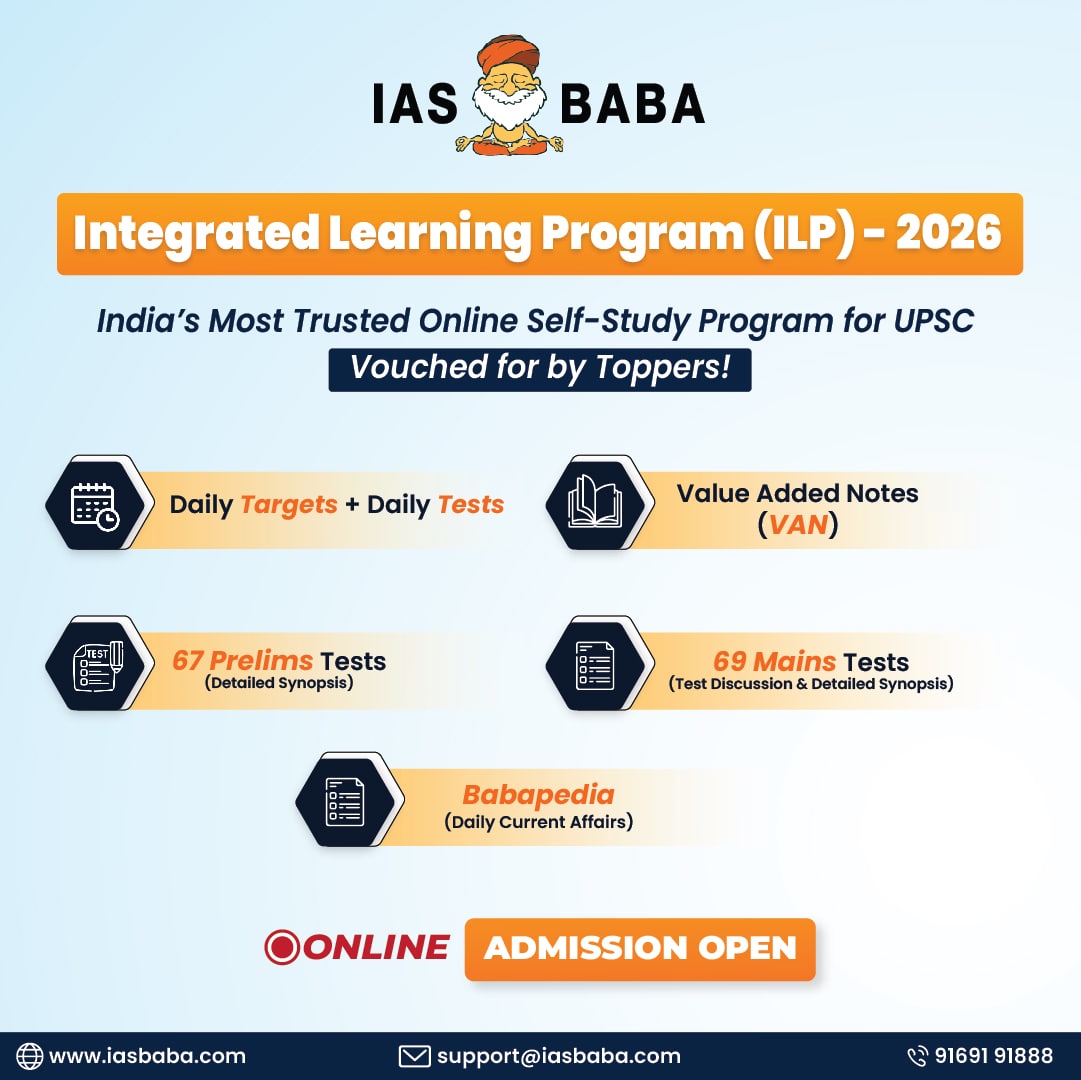Think and Learn-2015, TLP Mains 2015, UPSC, UPSC Mains- Think and Learn-2015
TLP: GS Mains Synopsis [Day 81]
Q.1) India is called a Quasi-Federal state. Do you think that India would have been a more successful state if more powers were given to states and Its federal structure was strengthened?
The Top Answer for this Question is written by – Cosviny
Ans) Indian is quasi federal state with lot of differences among its federal units. Stark imbalances in terms of administrative ,political and economic lies with them. Though devolution will not bring a similar benefits for all, but what we can get by more power devolution is enumerated below:-
1. According to FFC recommendations , if financial devolution is done it will bring state’s tailor made schemes rather then the CSS approach ,a single fit for all. The high administrative capacity and better infra will make state more successful by optimum use of resources but for poor capacity state leakage, corruption and vested interest of state local machinery can avail no benefit.
2. Political and administrative autonomy to state were also recommended Sarkaria and Punchhi commission. It will make states more responsible and accountable. But to strengthen cooperative federalism , elaborate guidelines on the issue like on NIA and NIC should be there.
What can be done to complement the devolution of powers to states:-
1. More autonomy for states would be further devolved to local self government in long chain of decentralization. It will bring responsivity, sensitivity, efficiency and economy to make capacity of states to make India successful.
2.The more autonomy can be complemented by concern for poor states like ‘special state category’ and autonomous council on the line of Tribal and Hill council for specific under developed areas.
Thus India need a balance in devolving power though more autonomy as a reward to some states alongwith paternalistic behaviour to other. In case of Internal security and emergency conditions art 355 , art 356 could not be ignored rather a overriding structure on the line of US homeland security is already recommended by commission.
Q.2) What states are to centre, local Self Governments are to states. Comment.
The Top Answer for this Question is written by – Cosviny
Ans) Decentralization – the transfer of authority and responsibility from central to intermediate and local governments lies behind relation between Centre – state and State-LSG. The nature of relation is similar on many accounts but have considerable differences also.
The similarity of both relationship can be cited by following points:-
1. On basis of principle- to foster development, reduce poverty and consolidate democracy,power should go to people because it ultimately rest with them.
2. Idea of rationale- efficiency and effectiveness and enhancing responsiveness
3. The need basis- the increasing role of government as enabler and to bring governance in liberalization and globalisation alongwith traditional role of government
The differences are more stark than similarities as observed:-
1. state has its own legislative body but local self government is not developed yet like District government.
2. There is clear delineation of powers between centre and states in schedule seventh. but no clear devolution of fund and functions for subjects as guided by 73rd and 74th amendment acts by state to LSG.
3. State government have control over its territory , population and functions with its own bureaucratic machinery separate from centre to implement. But local bodies still work under such state machinery.
4. The LSG’s are affected by problems of irregular elections ,suppression, inadequate representation, insufficient devolution of powers ,lack of financial autonomy and inadequate resources while states are more autonomous in various aspects.
Thus formation of states are part of federal structure in democracy while LSG are formed for democratic decentralization at grass root. The reason behind states and LSG’s can be different but purpose and philosophy is same.
Q.3) Separation of power is important for the smooth working of democracy. How is India’s separation of power different from USA’s. Which model do you think is better?
The Top Answer for this Question is written by – Cosviny
Ans) Separation of Powers among three branches like Legislative, Executive and Judiciary is necessary so that each branch with its power can put a effective check on the other.This principle works in both presidential model and Prime ministerial model of democracy. with some basic differences. The US’ presidential system have few advantages over Indian model in this context which are:-
1. As in US, president is executive and have authority to appoint executive team is separate from congress, the legislature. In India, a executive government has majority in Lok Sabha. In principle , it can put its own duties and fund sanction which seems a paradox rather a clear separation of power.
2. US president appoint federal Judiciary with advice and consent of senate. It is effective check over power of Judiciary while In India, well criticised Collegium system prevail which is not effective counterbalance between executive and Judiciary.
3. Executive president can veto a bill In US. Executive control over legislative such control in lies with Indian president who is not real executive.
Other side view is as follows:-
1. US president appoints executive team criticised as ‘spoil system’ while In india executive mainly come from legislature so a more harmonious and still separation of powers exist.
2. It is said that Supreme court made more amendments in US constitution than the congress through Judicial review. More then hundred amendments goes to credit of Indian parliament with minimum confusion and overlapping of jurisdictional territory, Though Indian constitution has also enshrined the principle of Judicial review.
Thus which system is better is not easy to evaluate rather it should be proved with their flexibility, adaptability and resilience while they are in work for a long duration of time in their own context and suitability.
High Order Thinking
Q.1) There is an urgent need to implement a national land use policy in order to address the issues of land use diversion, land acquisition and developmental imperatives. Analyse the statement in light of the controversies surrounding the amended Land Acquisition Bill.
The Top Answer for this Question is written by –
Ans) Untill 2013, land acquisition was governed by Land acquisition Act 1984.Previous government came up with the Land Acquisition, Resettlement and Rehabilitation Act, which further amended by the present government. The amendments made by the present government lead to many controversies, those are-
1.removal of consent clause for acquiring land for 5 purposes; namely:industrial corridor, PPP projects, affordable housing, rural infrastructure and defense.
2.removal of social impact assessment.
3.as per the existing law land will be given back to farmers if it remains unused for five years.However the amended version says the land will be returned only if the specified project on the land fails to meet the deadline.
4.earlier it was private company and now it has became any private entity.
These controversies would be addressed with a land use policy because-
1. reallocation of resources from agriculture to manufacturing and services is sine qua non of development.So a land use policy would help in structural transformation.
2.there should be well defined distinction b/w agricultural land, non agricultural land, fertile and infertile land before any acquisition of land.
3.property right should be maintained with proper land records.
4.agricultural productivity and market price of the land should be taken care of before any acquisition.
5.first farmer’s right and tribal’s right would be addressed with a land use policy.
Make in India initiative and recent reform in FDI would be implemented properly, if we address this issue of land acquisition in smooth manner while taking care of the issues of rehabilitation and resettlement with a land use policy.
Q.2) Are merit and affirmative action mutually exclusive? Critically examine. It is also said that the present discourse on affirmative action in India is fraught with contradictions and political manipulations. What do you think? Analyse the issue in light of the recent Supreme Court observation/ directive with respect to reservations.
The Top Answer for this Question is written by – Monk Who Sold his Nano
Ans) Affirmative actions are based on premise that humans are unequal and need leveling; a flawed concept to begin with. All humans are equipotential, but the potential is a vector and not scalar quantity. For instance, Sachin Tendulkar and Raghu Ram Rajan are both excellent in their respective fields, but affirmatively letting Rajan open batting for India or Sachin control banking for India, would be ridiculous. So, yes, merit and affirmative action are mutually exclusive.
Even from the context of historical wrongs, discrimination can’t be used to cure discrimination. In a democracy, state shouldn’t be involved in business of deciding what share goes to what community, or what new shares can be added. That puts the burden away from state of creating new opportunities by adding a new share for dissenting class of people. A neighboring authoritarian, communist state has been able to assimilate it’s dissenting Manchus, Shan and Tibetan populace, not by doling out freebies of reservation, but by creating equal politico-economic opportunities for them, same holds true for assimilation of African Americans and Hispanics in US.
Even from context of unfair advantage, every person is born with some inherent advantages/ disadvantages. I may not have equal educational footings as a kid born to parents who are professors, or equal financial footings with a kid whose parents are bankers. But it would be ridiculous if they are denied their deserved education or finance for my sake.
Affirmative action requires recognition, cooperation and cultivation of values of homogeneity. Reservation apparently fails in the later part. We can’t have homogeneity by propelling heterogeneity. Besides, ridiculously increasing reservations, without improving and adding opportunities would foment rebellions (Patidars/Jats/Gujjars). Reservation is no more a solution, but a problem itself.














